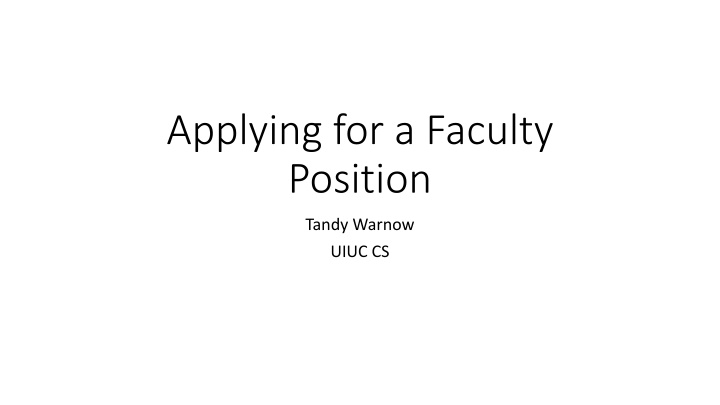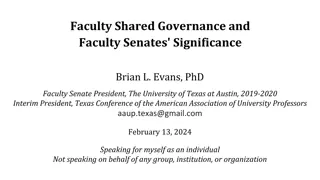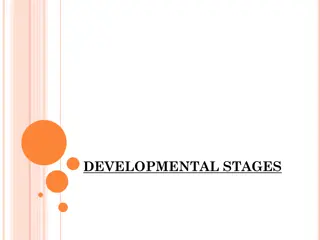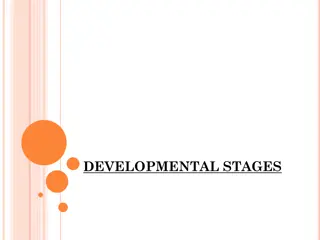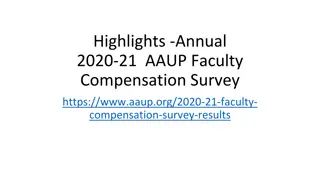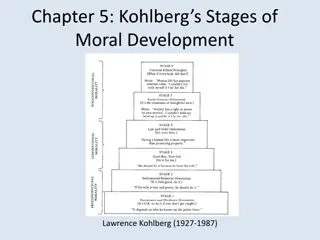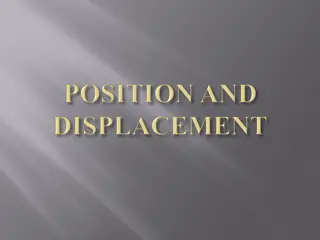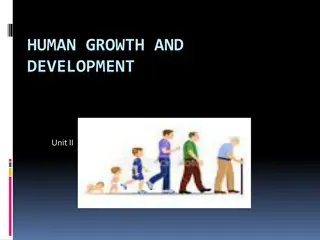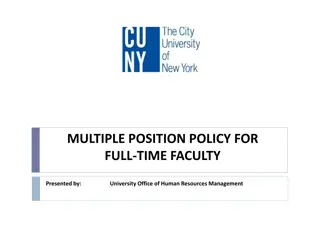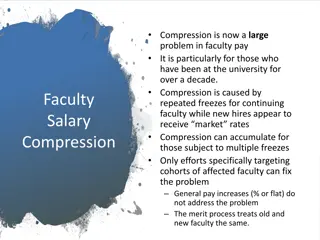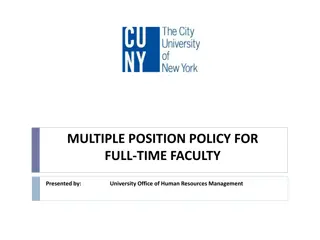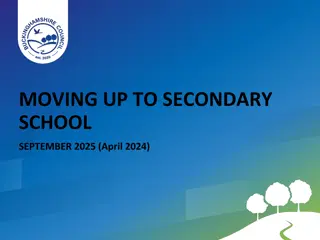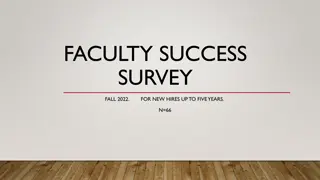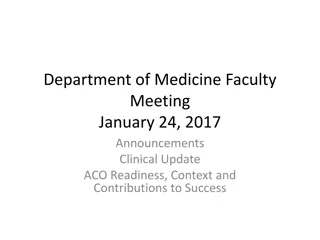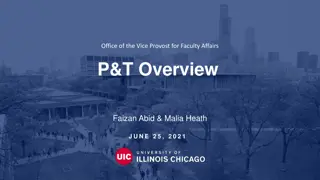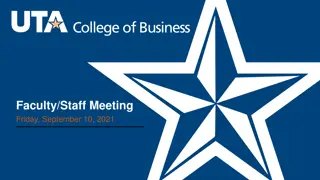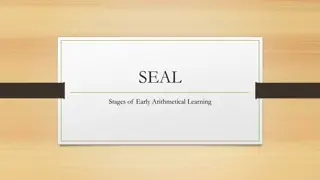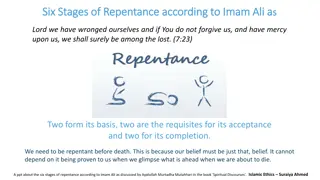Applying for Faculty Position - Stages of the Process
Where to apply by considering various factors such as department websites, mentor advice, and cultural fit. Prepare application documents like cover letter, CV, research & teaching statements to ace the application process."
Download Presentation

Please find below an Image/Link to download the presentation.
The content on the website is provided AS IS for your information and personal use only. It may not be sold, licensed, or shared on other websites without obtaining consent from the author.If you encounter any issues during the download, it is possible that the publisher has removed the file from their server.
You are allowed to download the files provided on this website for personal or commercial use, subject to the condition that they are used lawfully. All files are the property of their respective owners.
The content on the website is provided AS IS for your information and personal use only. It may not be sold, licensed, or shared on other websites without obtaining consent from the author.
E N D
Presentation Transcript
Applying for a Faculty Position Tandy Warnow UIUC CS
Stages of the process Stage 1: Finding who has positions, and choosing whether to apply Stage 2: Submitting the application Stage 3: The screening interview Stage 4: The real interview Stage 5: The post-interview period Stage 6: Negotiating, and then deciding between offers
Stage 1: Deciding where to apply Finding places that have positions Not necessary that they specifically list your research area as being of interest Check department websites Check CACM and other online lists Ask your mentors Choosing where to apply Two-body issues can constrain your search substantially Consider the departmental culture, history, and trajectory Don t apply if you are sure you won t like it Do consider places that you are unsure about (you can be pleasantly surprised)
Stage 2: Applying The application process involves several documents Cover letter (one page, but should give an overview of your research and mention why you are interested in the specific department and position) CV. This is essential! Make sure it includes everything, but especially highlighting publications, software, teaching, invited talks, service, etc. Research statement (2-3 pages) Teaching statement (1-2 pages) DEI (Diversity, Equity, and Inclusion): not always requested (1-2 pages)
Stage 2, cont Research statement: Goals: Explain research accomplishments and future goals to the entire department (not just people in your own area). Length: 2-3 pages (2 may be better) Suggested structure: Overview (very high level) half page Your specific accomplishments 1-2 pages Future goals half to 1 page Remember: The people in your area will likely read your papers, but you should still help them by letting them know which papers are most important, and why. Everyone else needs to be able to understand your work from what you wrote. But if you put in too much detail, they will stop reading.
Stage 2, cont Teaching statement Length 1-2 pages Describe experience so far Include mentorship of students (at any level) Include course development, anything involving education (not just classroom teaching) Discuss your goals as a teacher and educator Discuss your philosophy Say something about courses you would like to teach, and/or courses you would like to create
Stage 2, cont DEI Length: 1 page This is sometimes required. If required, take it very seriously. (If requested but optional, do provide one. If not requested, no need to provide.) You do not need to say anything too personal. Nevertheless, be thoughtful. Ask your colleagues or mentors for examples of good ones.
Stage 2, general advice Make sure your webpage is up to date, attractive, and informative. Provide link on your CV If you have a google scholar page, make sure it s up to date (perhaps create one if you don t have one) Get your mentor(s) to look at your materials before you submit. Fix all typos before you submit. How you write will also matter.
Stage 3: The screening interview Many departments do a screening interview by zoom. These are often scripted, at least in part, and limited in time. Make sure you allow them time to ask all their required questions. Zoom issues: lighting is important. Remember the Public Speaking training! Prepare! Find out as much as you can about the department. Be able to say who you might work with, what classes you might teach. Know something about other parts of their university (e.g., other departments that are relevant to your research). Using slides: Can be helpful, but don t use too much time with your presentation. Remember: The interviewers are trying to find out if you are a good hire, but also how interested you are in the position.
Stage 3, cont. Questions you might get asked: Describe your research at a high level for us. What are your 5-year goals for research? What funding sources do you see for your research? Who in this department might you work with? What courses might you want to teach? What has your experience been like in teaching? Why are you interested in this position? What do you know about our department? About our university? What questions do you have for us?
Stage 4, the interview We ve discussed this already. But in brief: Prepare! Know something about each person on your schedule. If doing this in person, make sure to take breaks (just ask for a bio break ). Use the time to review who you are seeing next. Remember to have questions to ask of each person. Do not start discussions about salary, or anything that amounts to negotiation, until after you get an offer. Your goal is to get an offer!
Stage 5, after the interview Do indeed send follow-up emails thanking the people you met. Be polite but pick level of formality that is appropriate. In general, most CS faculty are informal. Nevertheless, don t write to someone by their first name unless they invite you to do so (e.g., by signing their emails with their first name). Don t refer to Professor Susan Jones as Professor Susan or Dr Susan . If you need to be formal, write Professor Jones . Unfortunately, decisions take time. You may not hear for several weeks, and yet the outcome could be positive. Or negative. Being patient is difficult. If you don t get an offer, don t take it personally. (It s likely to be a competition between research areas more than anything else.)
Stage 6, after the offer Negotiation: recall Nancy s advice. Additional points: Absolutely make a second visit, and look at the neighborhoods you might live in. Check out the cost of buying a house or renting. (If they don t offer, ask for it.) Bad idea to accept a job in a place you are sure you do not want to spend more than a few years in. This is a decision that is very personal, not just professional. Find out as much as you can about the location, the university, etc. Be very honest and up front with your department head. If you feel you cannot trust them, then accepting the position is likely a bad idea. Timing: If you have deadlines coming up, tell the department head. If the offer has a time out that is too soon for you, for sure ask for an extension. Explain why. Be prepared to find it painful to turn down offers.
